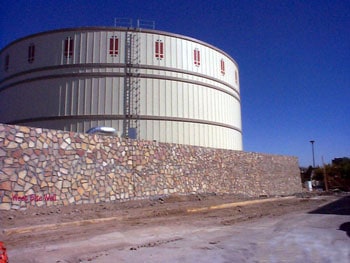
31 Jul Types of Insulation Materials for Tanks: Comparing Options and Benefits
Dive into the world of tank insulation materials and learn how Thermacon can guide you to the optimal choice for your storage tanks.
The Significance of Choosing the Right Insulation Material
The right insulation material can significantly improve the performance and lifespan of your storage tanks. A suitable insulation material will maintain the tank’s temperature, reduce energy consumption, prevent condensation, and minimize the risk of corrosion. It’s crucial to understand the available options and their unique benefits to make an informed decision.
Insulation materials vary greatly in their properties and applications. For instance, materials like mineral wool and fiberglass are renowned for their excellent thermal resistance and affordability, making them ideal for a wide range of applications. Polyurethane and polyisocyanurate foams, on the other hand, provide superior insulation values and moisture resistance, which is especially important for tanks storing temperature-sensitive materials or operating in humid conditions.
Emerging materials like aerogel offer outstanding thermal performance with a thin profile, allowing for insulation in space-constrained environments. And if your storage tanks operate under extreme conditions, vacuum insulated panels could be the perfect solution. These panels provide unmatched insulating capabilities but do come with a higher price tag.
It’s important to note that the material choice should also take into account the tank’s construction and design. Some materials might be more suitable for cylindrical tanks, while others are ideal for spherical or irregular shapes.
Polyurethane Foam (PUF)
Polyurethane foam, often abbreviated as PUF, is a common insulation material due to its excellent thermal resistance and low conductivity. It adheres well to the tank surface, ensuring a seamless insulation layer. Additionally, its lightweight nature makes it easy to handle and install. However, PUF requires a protective coating to shield it from mechanical damage and weathering.
Polyisocyanurate (PIR)
Polyisocyanurate, or PIR, offers a higher temperature resistance than PUF, making it a favored choice for high-temperature applications. It possesses excellent thermal properties and is resistant to fire. Like PUF, PIR also needs a protective coating for additional durability.
Mineral Wool
Mineral wool insulation, derived from rocks and minerals, is known for its robustness and fire resistance. This material is water repellent and retains its insulating properties even when wet, making it ideal for tanks located in damp or humid environments. However, it is denser and heavier than foam-based insulations, which may require more support during installation.
The Thermacon Approach to Material Selection
At Thermacon, we believe in a tailored approach to tank insulation. Our team of experts analyzes factors such as the stored material’s properties, tank dimensions, operational temperatures, and environmental conditions to suggest the most suitable insulation material. With our profound understanding of insulation materials, we can provide an optimal solution that meets your specific needs and budget.
Concluding Thoughts
The choice of insulation material plays a fundamental role in the efficiency and durability of your storage tanks. It’s not an area to be overlooked or underestimated, as it can directly affect the longevity of your investment and the functionality of your operations.
Different insulation materials offer diverse characteristics, such as heat resistance, moisture prevention, durability, and cost-effectiveness. Therefore, the selection process must be carefully executed, considering the specific needs of your storage tanks, the environmental factors, and, of course, your budget.
With over 300 different types of insulation materials to choose from, it’s understandable that the selection can be overwhelming. These materials can range from mineral wool, cellular glass, and polyurethane foams, to newer innovations like aerogel and vacuum insulated panels. Each of these materials has its own strengths and limitations in terms of thermal efficiency, moisture resistance, ease of installation, and cost.
But here’s where Thermacon’s expertise comes in. We have decades of experience in the insulation industry and a deep understanding of the variety of insulation materials available. We have always been at the forefront of the insulation technology, implementing best-in-class solutions for a wide range of applications.



Sorry, the comment form is closed at this time.